What are the predictions by a Technology Futurist? From AI and automation to the impact of these developments on businesses, healthcare, and governments. Including a list of 10 well-known futurists.
What is a technology futurist?
What is a technology futurist? What is the meaning of the word futurist? A futurist, just like a futurologist, thinks about the future: what are developments that will impact people, organizations, institutions, business, government and society. Futurists do this based on examination of trends they see in society, in scientific research or in other fields.
A technology futurist focusses on technological developments, like big data, quantum computing, virtual reality, and artificial intelligence.
Article Overview
This is an overview of the article:
- Top 10 Predictions;
- List of futurologists internationally (top 10);
- My method: 5-A model;
- Impact and ethics;
- Themes per year, 2025 and 2024.
- Models to explore futures (3x)
- Impact on domains of business, healthcare, education and government;
- Conclusion;
- Book tips;
- Hire me as a speaker or consultant.
Finally, leave a comment if you have a question or comment!
In this section, as a futurist I list 10 predictions for the future.
Top 10 technology predictions
What are the key trends and predictions for the future? This is a list of developments, based on my research.
- Digitization
- Mobilization.
- Screenification
- Disintermediation
- Transformation
- Intelligization
- Automation
- Virtualization
- Anticipation
- Robotization
In the list below, I have combined them and written a brief description.
Digitization & mobilization
#1 Digitization. Everything that can be digitized will be digitized. First it was mail, then music, movies, books and newspapers, followed by money, insurance and transportation. The main effect of digitization is that it becomes a lot cheaper or even free.
#2 Mobilization. Everything becomes mobile. Our interaction with computers becomes invisible and all-encompassing. Research firm Gartner aptly explains: ‘Sync me, know me, track me, see me, hear me, understand me and be me. That’s where mobilization is taking us.’ Our interaction with computers will also change with it. We will wear it closer and closer to (or in) our bodies and control the technology through our voice, touch, posture or artificial intelligence.
Sync me, know me, track me, see me, hear me, understand me and be me. That’s where mobilization is taking us.
Gartner (research firm)
Interaction & direct
#3 Interaction. We are going to communicate more and more through screens. This has been a trend for much longer. Newspapers and magazines we read on tablets. Instead of calling, we use Skype or other forms of video calling. Cars no longer have levers and buttons, just lots of screens.
Another form is Virtual Reality (VR) and Augmented Reality (AR), where through lenses and glasses we can immerse ourselves in another world (VR) or be shown a layer over reality (AR).
#4 Direct. This represents the development that no longer requires a distributor or middleman. One example is the music industry. With services such as Spotify and YouTube, the role of the music company has been minimized.
Blockchain technology is expected to play an important role in this, with the first signs being crypto currencies such as bitcoin.
Transformation & Intelligence
#5 Transformation. This term stands for something other than change or innovation. It is literally about becoming something else. Take the auto industry. Probably the focus of automakers soon will not be making cars (a product), but providing mobility (a service).
#6 Intelligence. Kevin Kelly calls this the driving force behind the next industrial revolution. Every object in our environment will be connected to the Internet. It will continuously measure the environment with sensors, receive and return information. These objects are intelligent through smart algorithms or neural nets. I elaborated on the similarities and differences in my article on artificial intelligence.
Automation & virtualization
#7 Automation. This is related to the previous trend of intelligence. Automation represents a development in which we can set up certain processes without human intervention. This can provide a high degree of efficiency and effectiveness.
This has a great impact on people’s work. According to a 2013 Oxford Martin School study, 50% of all jobs will disappear in the next 20 years due to automation.
#8 Virtualization. This represents the concept of having a non-physical copy of something. For example, the first developments in this area are that many applications no longer run on your laptop or desktop, but you can access them through the Internet.
Another form of this is 3D printing of materials, both artificial and biological. In the future, you will have a 3D printer at home that can print your new chair because you have the materials at home and have downloaded a model from an online platform.
Anticipation & robotization
#9 Anticipation. This development is largely driven by the development of intelligence (#6). We get used to getting information on time. Smart software tries to predict our behavior and needs. On a personal level, these are apps such as Google Now and Nest’s smart thermostat.
On another level, this development is piquing the interest of government, police and security agencies. Using big data, the software indicates where agents can best conduct surveillance. This is predictive policing. The movie Minority Report took this development to the extreme. There you can be arrested before you commit a crime.
#10 Robotization. Robots are the most obvious manifestations of the previous developments. We will use robots everywhere in our lives, just as we already use smart apps in our smartphones – right down to robots in factories, healthcare and education.
List of well-known international futurologists.
Futurist top 10
What are well-known futurists? I begin with foreign futurists and futurologists. Below is a list in no particular order that includes links to their newsletters or podcasts that I personally like to follow to stay informed.
- Peter Bishop (USA). A former Director of the graduate program in Futures Studies at the University of Houston.
- Professor Amy Webb (USA): owner Future Today Institute. They issue an influential (and comprehensive) annual report on key developments. Their newsletter is also highly recommended.
- I met Kevin Kelly (USA) myself once when he gave a lecture at the STRP Biennial in Eindhoven in the spring of 2017.
- Gerd Leonhard (SWI) wrote the book Technology vs. Humanity. This book influenced my thinking about the future quite a bit. A little further down is an interview I had with him.
- Bartalan Mesko MD Phd (HON). He has the blog The Medical Futurist and focuses on the (future of) healthcare.
- Liselotte Lyngso (DEN). She calls herself a Future Navigator.
- Azeem Azhar (ENG). Creates weekly newsletter Exponential View and has a podcast of the same name.
- Anne Lise Kjaer (ENG). She positions herself as a Future Narrator.
- Ray Kurweil (USA) works at Google, and is best known for his ideas around transhumanism.
- Myself * :)
*) If you would like to hire me as a futurist for a lecture or presentation, please contact me. Or check out the Trends 2040 page first for more information, examples and references.
Do you know another good futurist? Leave a comment below this article!
What is my method as a futurist?
My method: 5A-model
Foresight requires a systematic approach. My methodology is based on the Foresight Framework by Bishop and Hines. I also refer to my method as the 5A model.
- Anticipate: Determining the scope and timeframe. How far do we want to look ahead and which elements do we include?
- Analyze: Analyzing trends and signals, for example in my lecture trends 2040.
- Articulate: Developing future scenarios, for example, through scenario planning.
- Assess: Adjusting plans and strategies based on insights from the previous steps and conducting small experiments.
- Act: Continuously monitoring and adjusting the course. Foresight activities are never finished.
I like to compare this approach to sailing. You can not influence the wind or weather conditions. You must constantly read the environment and adjust your approach accordingly.
Do you want to know more? In this article about Futures Research I go through all of the steps.
- If you want to work with me: Strategic Foresight expert Peter Joosten.
In this section, I focus on the potential drawbacks and impact on us as humans.
Impact & ethics
Not all developments are on balance positive. The author William Gibson does say it aptly: “Technology is morally neutral until we start using it. Take interaction (#3). Already we face problems such as smartphone addiction or over-reliance on this technology.
Mobilization (#2) is already having negative consequences as well. Leonard: “With this, we also become increasingly traceable, naked, predictable, manipulated and ultimately programmable.
Technology is morally neutral until we start using it.
William Gibson, author
The moment we allow more screens and images into our lives, it can be disorienting and addictive. What if you have the perfect life in the virtual world and real life has many problems? It looks like the movie Ready Player One. To what extent is that science fiction or is it like “science fact”?
Another development in which many abuses now occur is in the platforms that establish direct contact between suppliers and consumers or consumers among themselves (#4). There has been much criticism of how Uber treats drivers or the impact a platform like Airbnb has on cities.
Letting go of responsibility
Perhaps the greatest challenges are in the area of automation (#7). Are we going to hand over responsibilities to algorithms and technology. In his book, Leonhard describes a few examples. Instead of visiting your parents, Skype. We blindly rely on recommendations from smart algorithms, such as which book to read, movie to watch or restaurant to eat at.
What if we cede our consciousness to computers where machines judge our morality, our values.
Steven Tallbot, author
Author Steven Tallbot outlines a dark scenario: “What if we cede our consciousness to computers where machines judge our morality, our values? In my opinion, this is one of the most important tasks we have now. How do we make sure we don’t automate everything? What is the reason for automating something? What can we as humans (still) do better ourselves?
Not free
The first development is digitization. But everything that digitizes, that eventually becomes free and abundant. Take the encyclopedia. You used to have to save money for a copy of the Encyclopedia Brittanica or the Winkler Prins. Nowadays, much more knowledge can be accessed for free through Wikipedia.
In his book The Inevitable , Kevin Kelly outlines a number of scenarios where there will still be a bounty or monetary amount. Below I have listed the scenarios with a brief example.
- Directness, like seeing a movie as soon as it comes out;
- Personalization, such as a drug tailored to your gene set;
- Interpretation, such as how to apply information about your genetics;
- Authenticity, such as an original painting by an artist rather than a copy;
- Access, like you can use Spotify to listen to any music in the world;
- Embodiment, like when you go to a live performance instead of watching the live stream;
- Patronage, as when you support a creator because of the work he or she does;
- Discovery, such as a restaurant reviewer who specializes and is experienced in judging restaurants.
Looking at this list: will you soon still be able to get money for the work you do or the products and services you make within your business?
What else has stuck with me from Kevin Kelly’s book are two other things that will not go away. Both are human in their deep essence – trust and stories. Trust cannot be downloaded and copied; it has to be earned over time. The same goes for stories. The medium through which we tell and take in stories will change, but stories in themselves will not disappear. This is very deep in our evolutionary system.
Impact on people
Arthur C. Clarke is one of the best-known futurists. He said, “Any sufficiently advanced technology no longer distinguishes itself from pure magic. Take your own life right now. Actually, it is pure magic that we can access all the world’s information via the Internet, listen to millions of hours of music with our smartphone, and find our way flawlessly with a navigation app.
Any sufficiently advanced technology no longer distinguishes itself from pure magic.
Arthur C. Clarke, futurist
The possibilities of technology are only increasing exponentially and blending together. Leonhard writes very aptly, “Soon it will no longer be a question of whether something can be done, but how, where, when and why. The question of what we want as people, as a society and as a country is becoming increasingly important. For that reason, I don’t think ethics, politics and philosophy are becoming obsolete. It becomes more important as far as I am concerned! I’ll write more about that later in this article.
Application
What should we as humanity do with these developments? Just because something can be done does not necessarily mean we should do it because of that. Gerd Leonhard makes a start on this in his book. According to him, it will soon be all about human skills, such as creativity, compassion, originality, responsibility, communication, empathy and empathy.
The human soul must continue to rule over technology.
Albert Einstein, physicist
This is the only way we can continue to use technology wisely. Earlier, Albert Einstein also said it beautifully, “The human soul must continue to rule over technology. Perhaps this is an old-fashioned humanistic view of the world, where man is the center of everything.
But is there an off switch to these developments, or have we already set something in motion that cannot be stopped? Consider the development of the atomic bomb, a comparison regularly made by philosopher Sam Harris and others.
Consciousness
Indeed, another direction is that machines may also one day have empathy, compassion and a holistic view. Probably they can measure human interaction better than we will soon. Now there is facial recognition software that can read emotions better than we as humans can. But can that software simulate human interaction, as in the movie Ex Machina?
Do computers ever gain consciousness? We ourselves do not know at all whether consciousness, the soul or the higher consciousness actually exists and then where it is in our body. For example, I participated in a panel discussion on longer life where cryonism was also discussed [link onderin]. Some of the people who have frozen themselves did so only with their heads.
If they are brought back to life and placed on an artificial body, will they be the same? Or do we think we have a soul, but these are actually biological, chemical and electrical processes in our brains that we cannot understand?
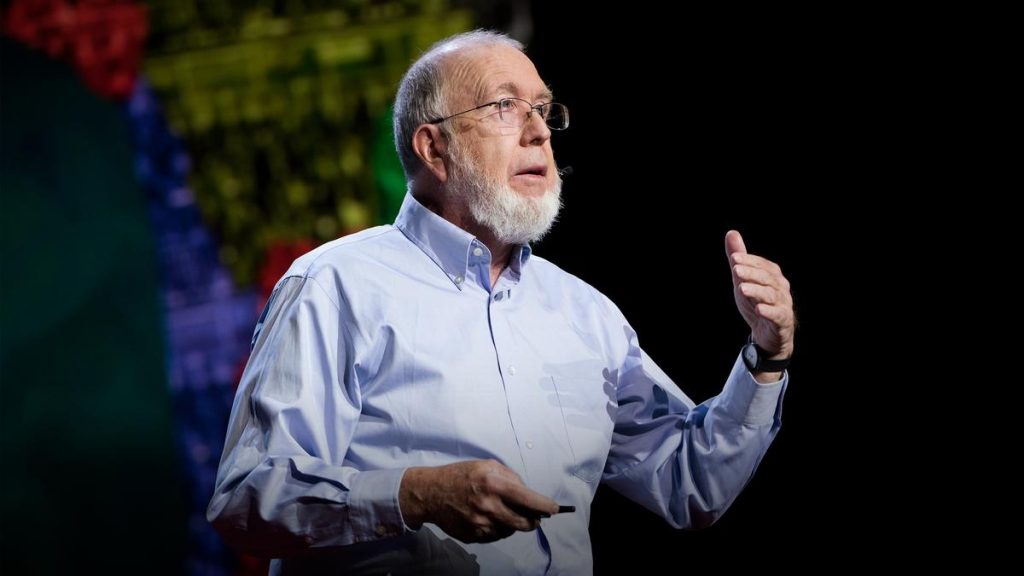
Themes per year.
Themes per year
What are important themes for the coming years? Every year, I write an article about the trends I follow for that year, such as the technological trends for 2025, 2024, 2023, 2022, and 2021.
What is the difference between trends and themes?
- Trends are concrete changes that we are currently seeing happen, such as AI agents.
- Themes are the larger movements behind them, such as the deeper impact of AI.
In this article, I write about the themes that I monitor each year.
Themes for 2025
These are the themes that I am following with great interest in 2025.
- Climate change, innovation, and adaptation
- Energy as technology
- Discussion about AGI
1 Climate Change, Innovation, and Adaptation
A few years ago, I expected there to be more societal and political support for climate measures. Think about investments in renewable energy, phasing out subsidies for fossil fuels, and a tax on jet fuel and airline tickets. In 2024, election results in countries like the Netherlands and the United States showed that voters do not appreciate such initiatives.
For 2025 and beyond, I wonder if there will be more support for measures to mitigate climate change. Even the increase in extreme weather and climate disasters, such as the fires in Los Angeles in early 2025, do not seem to significantly change the sentiment.
At the same time, there are encouraging developments regarding adaptation, with citizen participation and new innovations:
- Adaptation: Cities designed like a sponge with parks and abundant green spaces, as Turenscape is realizing in Chinese cities.
- Innovation: Technological breakthroughs are emerging rapidly, such as new materials for solar cells or seaweed as a replacement for plastic.
2 Energy as Technology
Energy is transforming from a finite resource into a technological solution, with renewable sources becoming increasingly efficient and cheaper due to innovations in solar energy, wind turbines, and battery storage.
This shift has far-reaching implications: from new possibilities for CO2 capture to geopolitical power shifts, where traditional oil countries lose influence while countries rich in rare earth metals gain importance.
For all these reasons, energy technology is a theme for me to keep an eye on in the coming years.
3 Discussion about AGI
The introduction of OpenAI’s model o3 at the end of 2024 marks a revolutionary breakthrough in AI development, with unprecedented scores on the ARC test , FrontierMath , and programming skills, thanks to an advanced system that generates and filters hundreds of solutions.
This progress fuels debate about the impending arrival of Artificial General Intelligence , with experts questioning whether comparing artificial and human intelligence is relevant, while many underestimate the rapid advancements in AI.
Apart from the discussions about whether AGI will come or not, I believe that many governments, companies, and individuals underestimate the rapid progress in AI itself. Even without becoming AGI, AI remains a theme to watch.

Themes 2024
I get my inspiration, insights and ideas from reading (newsletters, books and papers), watching (documentaries and films) and talking (with experts and practitioners).But I also love going to conferences as a visitor. For example, I recently went to The Next Web, Brave New World, Dutch Design Week and the Amsterdam Business Forum, all in The Netherlands.
This is what I learned there:
- AI everywhere
- Impact of technology
- Moral ambition
1. AI everywhere
It was unmissable at The Next Web (Amsterdam and Zaanstad). During the lectures, at the stands on the exhibition floor and in all conversations, artificial intelligence (AI) was the main topic.
Nice example from Philips. Shez Partovi MD, chief innovation & strategy officer there, said their goal is for AI to be invisible to doctors and patients.
Smartphones have smart algorithms to filter out noise. Philips uses a similar method to improve the quality of the CT images and much less radiation is required.
Shez Partovi, Philips
2. Impact of technology
At the Dutch Design Week (Eindhoven) I saw a greater mix of topics. The common denominator is that it is about the impact of technology and what our future can look like.
A few things from the overwhelming selection that struck me:
- Mobility. Gas to Green by Yang Yu and others. What are we going to do with gas stations if we drive electric en masse?
- Body: Metacarpus by Stefan Boerkamp. Fun idea: how does our hand look in the future? With sensors, mechanistic, or rough?
- Nature: Waag shared their project Looking at nature about what we can learn from non-human intelligence.
In addition, there were many designers who explored the social impact of artificial intelligence with their designs. Such as the Threads of Data project by Troy Nachtigall and Juliana Kahl: a translation of your digital footprint into a garment.
Cultural consequences of AI
The theme at Brave New World (Leiden) was the future of attention. The lecture that particularly stuck with me was by Regina Joseph.
She said that there appears to be a connection between the rise of social media and the decline in academic performance. Also special: social media seems to make the top 100 music songs less diverse.
With a nice reference to Aldous Huxley, she called this ‘the flattening of the mind’.
That makes me think about what all those generative AI tools mean for our culture. Does that lead to better music, films and books? Or does it mean more mediocrity and fewer surprises?
3. Moral ambition
Moral ambition is the most recent work by Rutger Bregman, author of the book Humankind: A Hopeful History. He states that a full-time career consists of 2,000 working weeks. And:
How we spend that time is one of the most important moral decisions of our lives, but right now countless people are wasting their time in dull, pointless, or even harmful jobs.
Rutger Bregman, author
During his lecture at the Amsterdam Business Forum (Amsterdam), he argued that more people should use their talent for important causes.
I’m curious: will we see more talented people use their capabilities to solve current world problems in the coming years? I hope so, because technology is not the (only) solution.

What are useful models for exploring the future?
Models (3x)
What are the three characteristics of developments that a futurist looks at? These are them:
- Exponential change
- Recombination
- Recursivity
A core concept in futurology is exponential change. The basis for this is Moore’s Law. In essence, this theory is that the processor speed on a chip you can buy for $1,000 doubles every 18 to 24 months. It applies not only to transistors in an integrated circuit, but also to computing power, storage capacity and genome sequencing. Ray Kurzweil calls this “the law of accelerating returns”. At first this does not seem spectacular, but over time each doubling is a huge jump.
The problem is that it is very difficult for the human brain to contain an exponential jump. We are used to linear thinking. We expect the technology we have now to just get better and faster. But we do not take into account enough crossovers between technologies or radically new developments.
Recombination & recursivity
An example of cross-pollination is a term I heard at a conference on artificial intelligence in the fall of 2017. The term was “quantum AI”; that stands for “quantum computing,” combined with artificial intelligence. Another term for this is recombination.
In his book, Gerd Leonhard uses a third characteristic of future development (besides being exponential and recombination). This is recursivity. These are systems that can update and upgrade themselves, like robots that can reprogram themselves to handle new tasks each time.
You can already see the first signs of this: operating systems update themselves automatically or an online service like Google all performs daily tests, improvements and changes.
Interview futurist
In 2019, I had an interview with German futurist Gerd Leonhard. We talked about technological developments, the opportunities they present and the (social) challenges they bring.
Watch the interview below or on my YouTube channel.
In this section, I go over the impact of the developments on a number of domains.
Impact (4x)
Nowadays, I am increasingly hired to speak at companies and institutions about the impact of these developments. I then focus particularly on the following areas:
- Business
- Care
- Education
- Government
I have tried to outline below the impact of the aforementioned developments on these domains. I do have to add the caveat that these are vistas of lines that I am currently seeing and traversing. It is very likely that the future will look different, but hopefully it makes you think!
1 Business
What is the impact of these developments on business? The most obvious development is transformation (development #5). This means that companies and organizations must always consider what kind of value-added services they provide to remain relevant. In addition, it requires them to scan the environment for signs of unknown competitors.
In the recent past, Apple’s meteoric rise with the introduction of the iPhone is the most telling example. This left its mark on phone manufacturers such as Nokia and Ericson, among others. In proximity to this example; Kodak was surprised by possibilities of digital photography (first separately and later as functionality in smartphones). The music industry did not know how to handle the rise of Napster and online streaming services, such as Spotify.
Services
Another consequence follows the example of Spotify. As more and more things are digitized, more and more industries are also becoming service-oriented rather than product-oriented. Records, music tapes and CDs were replaced by online subscriptions for all types of music. One example that is emerging now is mobility as a service, with examples such as Uber and Lyft.
Finally, a third consequence is that counter-movements arise. When I tell people during lectures and presentations that in 2050 it will be illegal to drive your own car, sometimes people get angry. I then respond that there will be separate circuits where you can drive. Another counter-movement is that offline living is becoming a new luxury. In a world where you’re always connected, soon you’ll be paying to not be online for a while.
2 Futurist care
According to Gerd Leonhard, artificial intelligence and genetic modification are the two most important technological developments. Both developments have a massive impact on the future of healthcare. I previously wrote an extensive article on innovation in healthcare and healthcare technology.
As for genetic modification, the impact is direct: medical specialists may soon be able to permanently cure genetic disorders. This can be especially true in cases where a condition is directly related to one gene, such as sickle cell anemia, an inherited form of anemia. Instead of medication or other treatments, medics will soon be able to use this to cure certain conditions relatively easily forever.
Digitization
Another important development at play in healthcare is increasing digitization (development #1). About this, I spoke with Zayna Khayat of the REshape Center at Radboud University Medical Center in Nijmegen. According to her, healthcare is still the least digitized compared to other fields. The more aspects of care are digitized, the more other technologies can build on this.
Take artificial intelligence (development #6). This is increasingly used by physicians and specialists, for example, for distilling professional literature and analyzing disease states. For example, there are examples where artificial intelligence is better at analyzing skin, for forms of skin cancer, than dermatologists.
The digitization of professional literature and images, for example from the radiology department, allows artificial intelligence to help medical specialists in this regard.
Patient data
In addition to images, much more patient data is available and patients are increasingly collecting it themselves. I frequently speak at healthcare facilities and hospitals, introducing myself as a patient from the future.
In fact, I have had my DNA analyzed, take daily measurements of a number of health indicators and wear a chip in my hand. Because I took measurements over a longer period of time, this is a more valid and reliable picture of my health than when I get a single measurement at the doctor’s office or hospital.
Property
Ownership, management and access to medical data in electronic health records, for example, is still a challenge for many healthcare organizations. My ideal would be that ownership to my health data is registered in the blockchain, where I myself can release parts of my data to certain users. For example, my family doctor will soon be allowed to see all the data, my insurer only the basic data, and my sports coach my food intake and calorie consumption.

3 Futurist education
Education is affected in several ways by the aforementioned developments.
In a world where people live hundreds of years, you may also have multiple careers. Lifelong learning then takes on a very different meaning than it has now. Another development is the increasing availability of resources, such as virtual reality to learn, play and experiment with (development #8).
Basic Knowledge
I think certain basics still need to be taught such as language and math. But in a world of technology and software, children may also need to learn programming and coding. New professions are going to emerge. Similarly, 20 years ago, we wouldn’t have thought there would be app developers today. Perhaps then we will have “algorithm developers” and “robot personality trainers. Education must actively respond to this.
In a world where with artificial intelligence (almost) all the answers are available, asking questions becomes essential. Just like messing around, experimenting, innovating, failing and practicing. These are all activities that a computer or robot, focused on efficiency and effectiveness, cannot do as well.
However, those activities are essential to grow and learn. I myself think of the ways I learn best: not by reading it or hearing it, but by experiencing it, making mistakes and reflecting on them.
Skills
To continue learning this, traits such as curiosity, passion and imagination are important, as are social skills, emotional intelligence and critical thinking. These are pre-eminent skills that a person possesses and can transfer by guiding, coaching and failing a scholar.
For that reason, I don’t think the teaching profession is going to disappear, it’s just going to change. This is also the example Kevin Kelly cites when it comes to chess, for example. The best chess player is not a human or computer, but a centaur. That’s a team of grandmasters with artificial intelligence.
In this combination, teachers will collaborate with artificial intelligence in the form of robots. The robot guides students along an individual learning path at their own pace, with the teacher’s role increasingly shifting to training in human skills and abilities.
Brain implant
The role of genetic modification and brain implants is even more exciting in this. Will it soon be possible to have a super-smart child on demand, who at some point will also receive a brain implant (like Neuralink‘s vision) where he or she will have instant access to all the knowledge in the world? What does education mean then?
This is precisely when ethics are even more important, along with the skills and competencies mentioned earlier. Children need to learn what they can do with all these immense abilities, how they can use it for their own lives, for those around them and for society and the world in the best possible way.

4 Futurist government
Public institutions and the government itself are in the midst of change. One of my clients at a province aptly put it: ‘The world around us is changing at a rapid pace. We as a government have to keep up with it to stay relevant.’ This is true in several aspects, for example the increase in big data through sensor technology and citizens sharing their data with the government.
Role of government
The government’s job is to draft, implement and enforce laws and regulations. Public values such as privacy, (digital) security and democracy may be compromised by the pervasive technology. But it is precisely when that technology pushes forward that government must consider how laws and regulations can remain relevant or how they can otherwise ensure that public values remain protected.
For that reason, I don’t think politics is becoming irrelevant. For now, it remains a human, social, ethical and political consideration of how we want to apply all this technology.
It’s not easy. The relationship between the tasks of government and politics with science and technology is aptly depicted in the illustration below.
Retirement
There are also many questions in other areas: how should we deal with our current pension system when technologies become available that allow us to live to be 200 or 300 years old? What does this mean for the education system and for institutions such as marriage?
Related to this is the question of what role remains for government, especially at the national level. Large (technology) companies such as Facebook and Google operate globally. Can you as a country still escape their influence? Another threat is the erosion of the financial position of governments as more and more labor (and thus taxes on labor) disappear. For this reason, ideas such as basic income are being considered and experimented with.
Disruptive
All these developments feel disruptive. Arie van Bellen, director of ECP, said:
‘Technology is disruptive. Institutions such as schools, healthcare and politics are not adapted to the new reality.’
Arie van Bellen, director ECP
According to him, there is no point in developing against it, but it is about responsible use of new technology.
Someone in the audience responded, “It is very naive to assume that politicians or teachers can explain to children how to use technology responsibly. The question if there is an answer: ‘Just as businesses have to continuously adapt themselves, the same is true for government and politics. It’s not simple.’
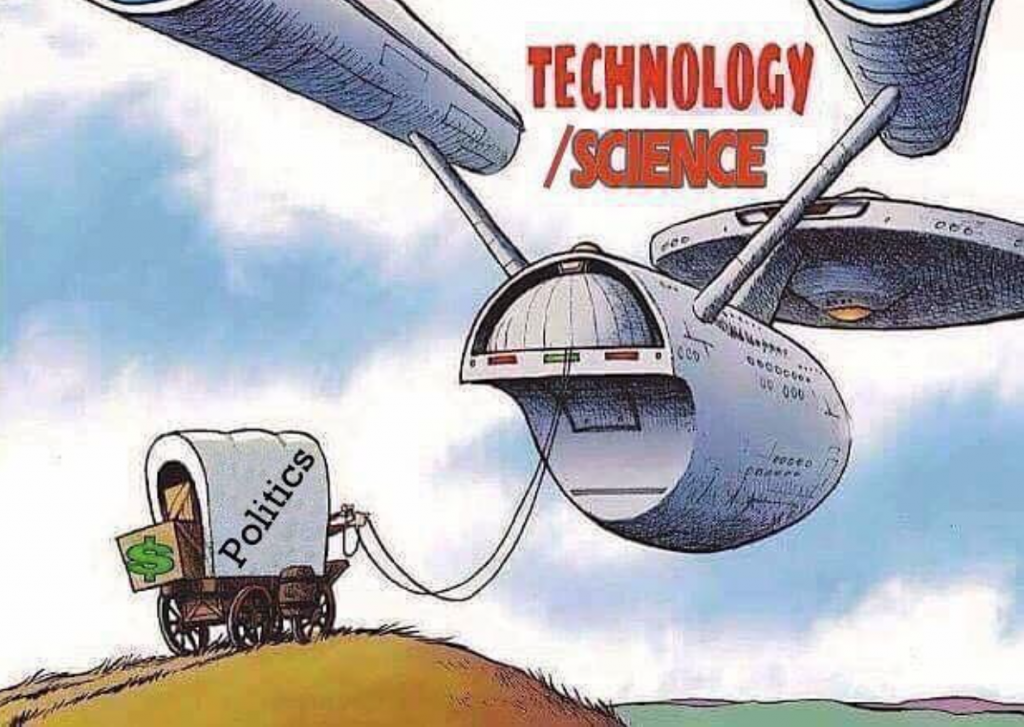
What is my conclusion?
Conclusion
As a person or an organization, what should you do with the images and visions of the future such as those in this article? You may be thinking, “We have to stop this! In my opinion, this is a nice thought, but also naive. After all, the train of technology thunders on, whether you want it to or not.
To return again to the statement “Soon it will no longer be a question of whether something can be done, but how, where, when and why. Progress, on the other hand, is also not something that happens to us. It is not a game where we sit back and passively let everything happen.
Everyone is affected, both in your individual actions and also the influence you have on larger powers such as politics, social debate, religious institutions and ideologies. How I look at our use, for better or worse of all these developments, varies from day to day.
Dystopia
That I am sometimes negative is because of 2 things. First, one of the iron laws of history is that luxury often develops into necessity and then creates new obligations. In his book Sapiens, Harari writes, “Once people become accustomed to a certain luxury, they start taking it for granted. This applies not only to humanity, but also to individuals.
Second, as Homo Sapiens, we are ecological serial killers. Over the centuries, even long before the agricultural revolution (10,000 years ago), we were the deadliest species on earth. Now with global warming, the rate at which we are doing this is actually only accelerating.
Soon we will be much more powerful because of all the aforementioned developments. Then what happens?
Utopia
Sometimes I think the future is mostly positive. Through genetic modification, artificial intelligence, biohacking and other technologies, we as humans are able to cure diseases, live longer and possibly travel to other galaxies. Not that everything is only positive, but I believe in the power of people to make the right trade-offs in this and experiment.
I also believe, however naive it may be, in man’s ability to act properly and, should things go wrong unexpectedly, in man’s ingenuity to fix it. This is also how we once developed from the African savannah to where we are today.
Another reason is history. The current times we live in have never been better. There has never been so much prosperity compared to the past, we have never been so healthy and there have never been so few war victims.
By continuing to try and adopt a curious and inquisitive attitude, we can largely influence progress ourselves. Welcome to the future!
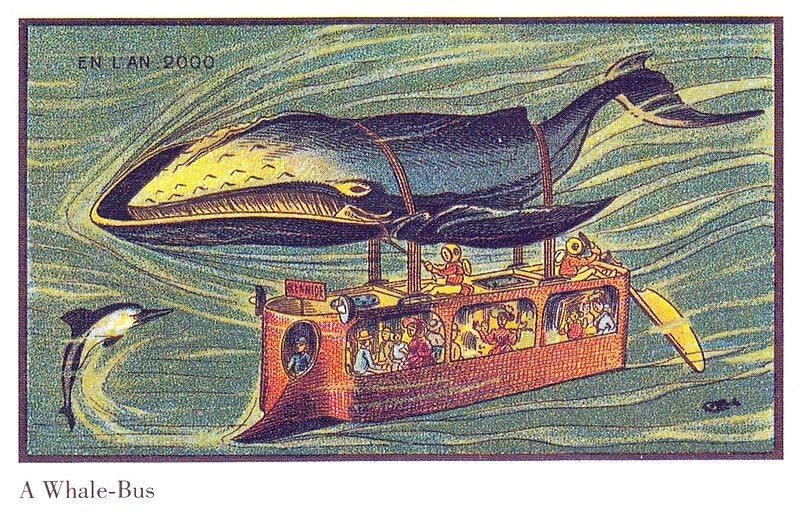
Extra: what are my book tips, and a video about my work as a futurist.
Book tips
In the article, you’ve already read some book tips, including:
- Book The Inevitable – Kevin Kelly
- Book Homo Deus – Yuval Harari
- Book Technology vs Humanity – Gerd Leonhard
- Book Life 3.0 – Max Tegmark
- Book Superintelligence – Nick Bostrom
Here you find a overview with my book tips: My Book Tips about Technology, Future (Studies), and Innovation.
On my YouTube channel, I made this video about 5 concepts, ideas and theories:
PS. If you would like to hire me as a futurist for a lecture or presentation, please contact me. Or check out the Trends 2040 page first for more information, examples and references.

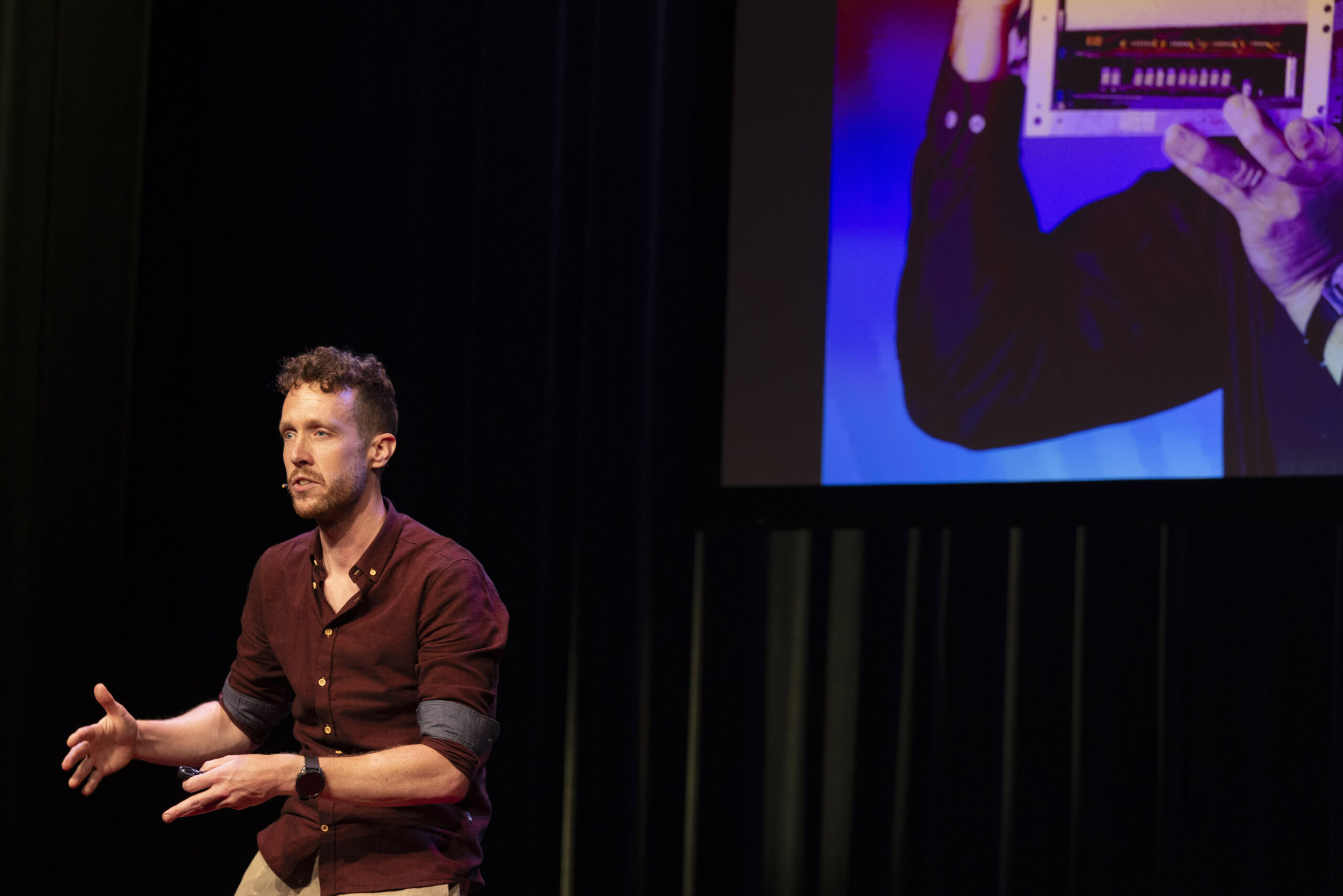
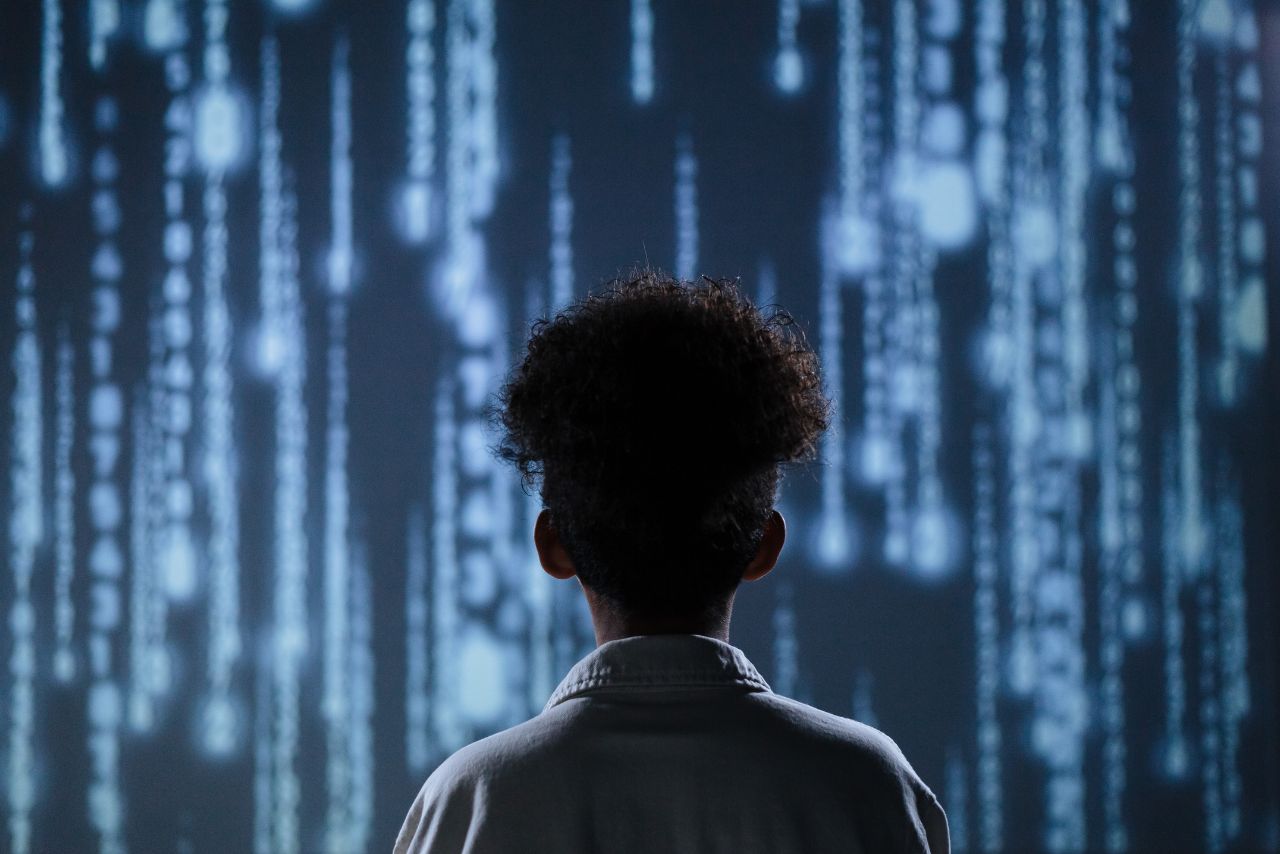
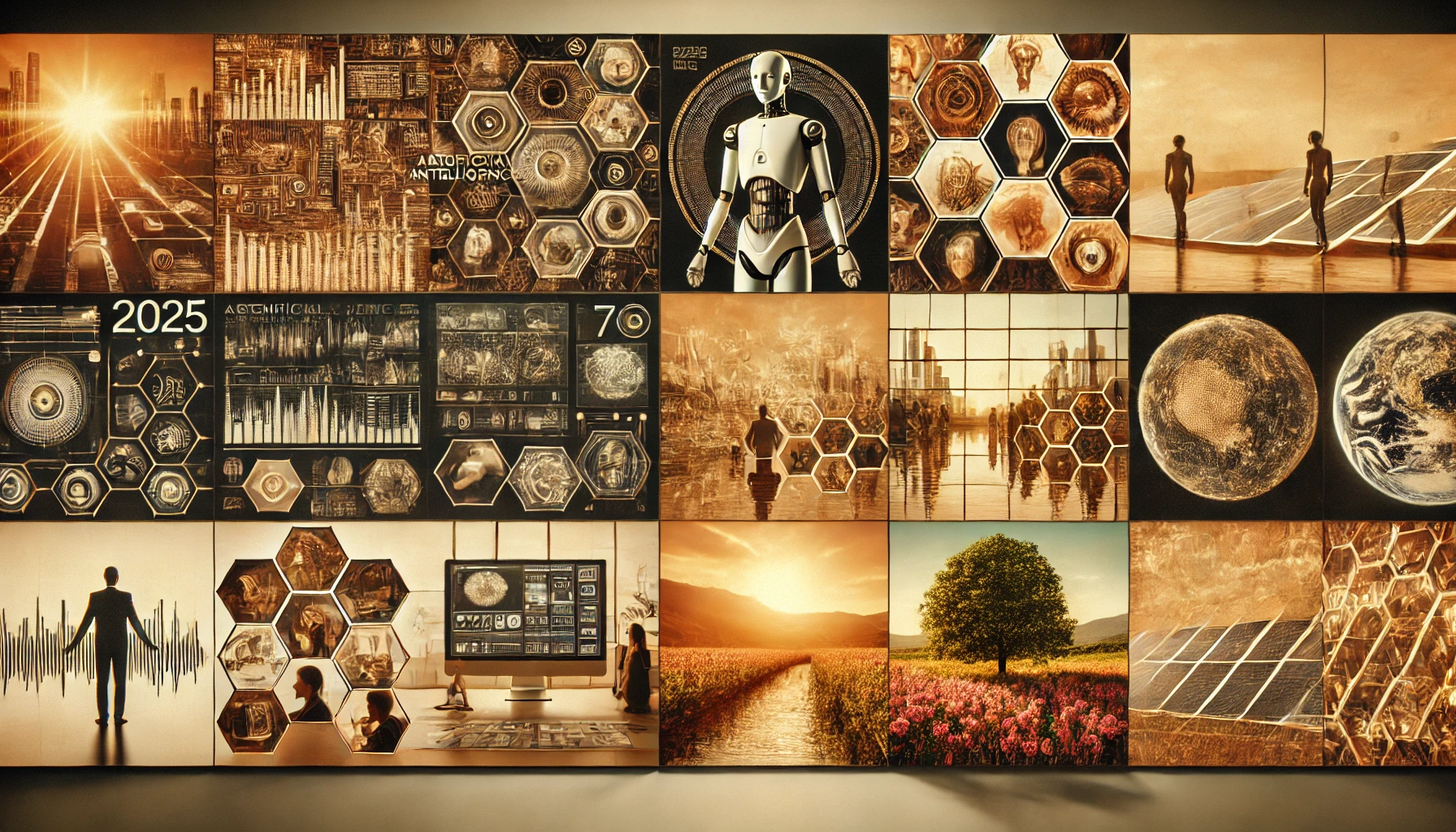
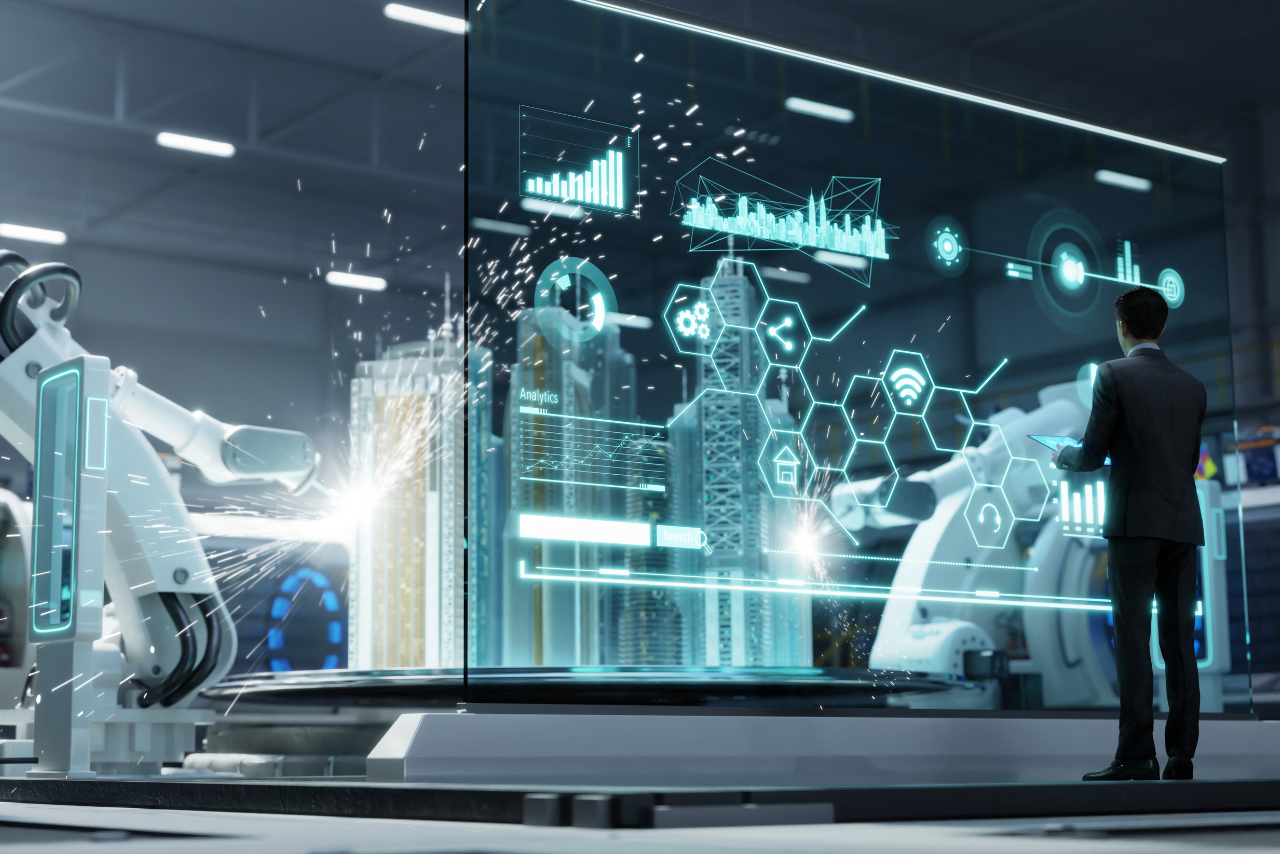
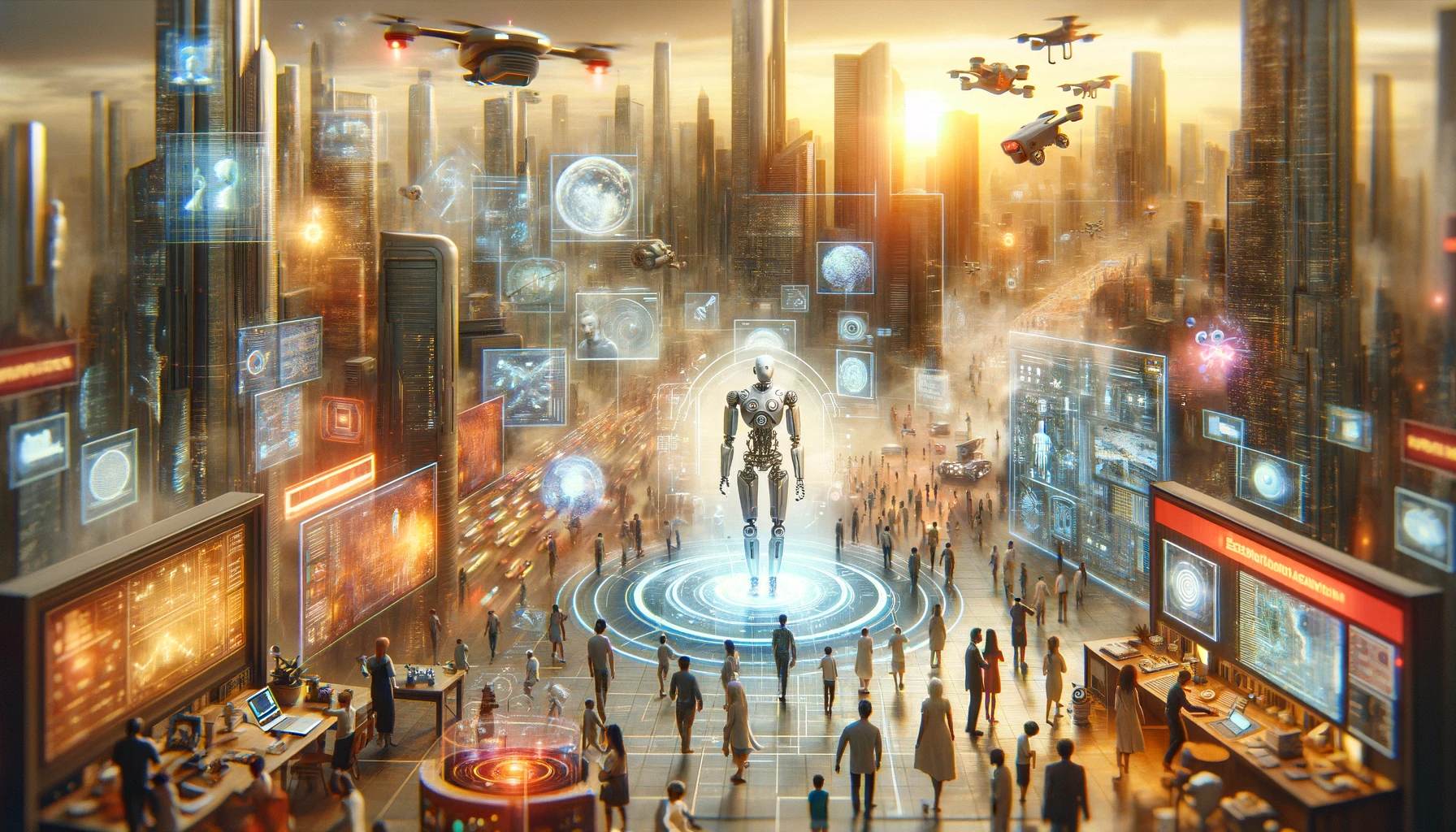
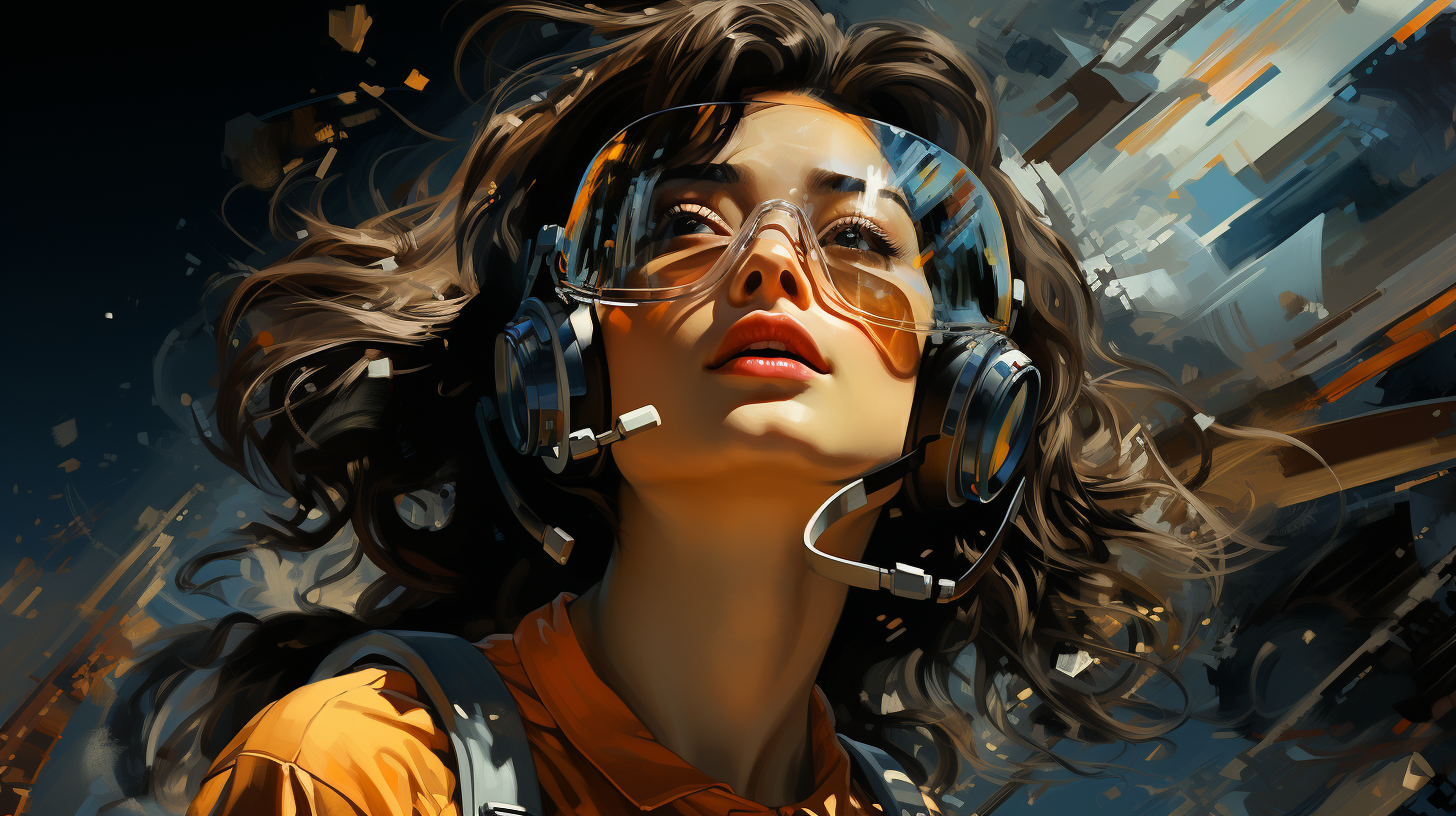
Humanity. The ability to hear, feel, see, love and respect. It comes from within. We determine it. How to be at one and speak it.